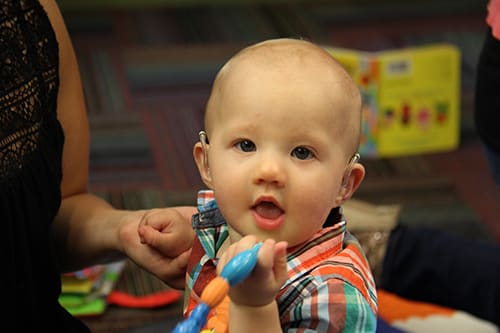What causes hearing loss in infants?
By Sara Baines-Miller | Posted on: February 25, 2020

Hearing loss is a common birth abnormaity
The excitement and anticipation before the birth of a child is like no other. All of the celebration, planning, and eager wondering about what the baby will be and bring is natural during pregnancy. Will it be a boy or a girl? Will they inherit Dad’s sense of humor or Mom’s chin? Will they be good at music or maybe sports? For most parents, deafness isn’t something they consider much in those musings.
According to the March of Dimes, up to 3 in every 1,000 babies are born with some kind of hearing loss in the United States each year. Hearing loss is a common birth abnormality, and it can range from mild hearing loss where some speech sounds are audible, to complete or profound hearing loss. A baby’s hearing is typically tested as part of newborn screening at the hospital, but additional screening may follow to determine severity if there is a concern.
3 general categories of causes
Genetics
Genetic hearing loss can be present at birth or can develop later in life. An infant can inherit hearing loss from one or both parents, as the gene can be carried even if both parents hear at “average” levels. The hearing loss may be part of another genetic syndrome, such as Down syndrome, Usher syndrome, or Treacher Collins syndrome. Gene mutations can also cause one of two different kinds of hearing loss – syndromic where the hearing loss happens along with other health problems, or non-syndromic where the hearing loss is the only condition the baby has and is more common. Congenital hearing loss is when a baby is born with hearing loss, but genetics can also cause hearing loss as infants get older as well.
Events during pregnancy
Viruses and infections can be passed to babies while in the womb. Some of the viruses and infections that can cause hearing loss include cytomegalovirus, herpes, measles, rubella, syphilis, and toxoplasmosis. Symptoms like body aches, headache, fatigue, fever, coughs, and rashes can be associated with these, so pregnant women should always reach out to their doctor with any health concerns during pregnancy.
Hearing problems can also be caused by the way the ears, head, or face develop in the womb. If the shape or structure of the baby’s ears is different, it can affect their hearing. Regular checkups and ultrasounds during pregnancy can monitor the baby’s development to track possible changes in development.
Premature birth and having a low birth weight can also affect a baby’s hearing. In these instances, the infant’s development may not be complete and hearing loss may happen at birth or even later in life.
Events after birth
Hearing loss in babies can be caused by infections, especially when they are severe. Ear infections usually only cause temporary hearing loss, but if they damage the infant’s eardrum, the bones of the ear, or the auditory nerve, the hearing loss can be permanent, according to the March of Dimes. Additional infections that can affect hearing loss are meningitis and measles, as well as other conditions like head injuries, severe jaundice, very high doses of some medicines, obstructions or damage to the ear canal or eardrum, and frequently being around loud sounds.
The causes of infant hearing loss are numerous, ranging from genetics, issues during pregnancy, and issues occurring after birth. Hearing is generally checked as part of newborn screening, but some causes of hearing loss in infants don’t develop until later on in life. Whatever the cause of your child’s hearing loss, DePaul School for Hearing and Speech offers education and resources for parents and children as they face diagnosis and beyond.
Share This Article:
